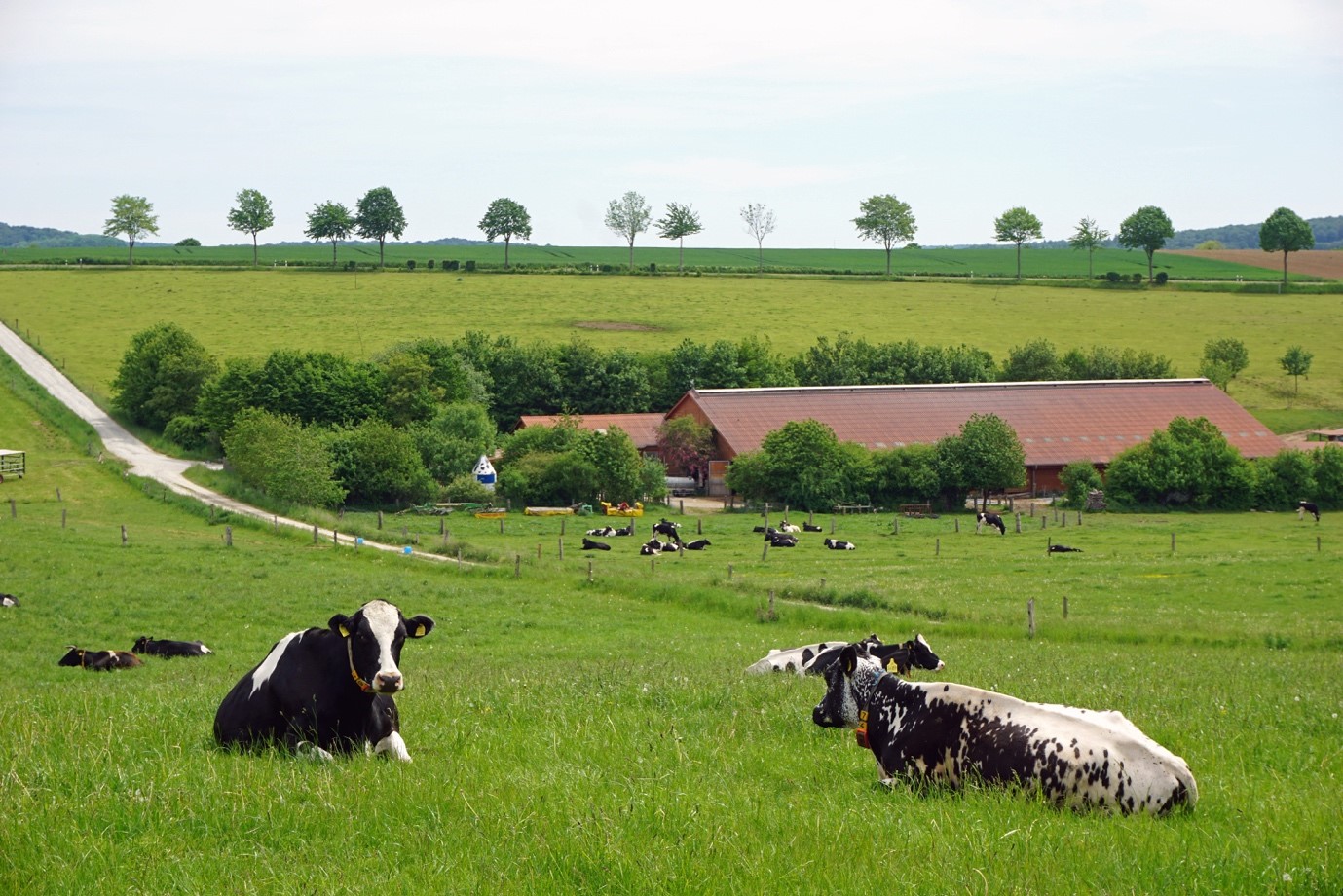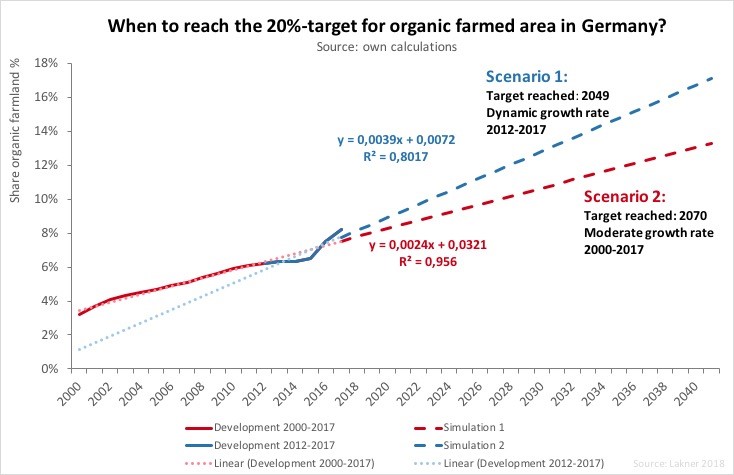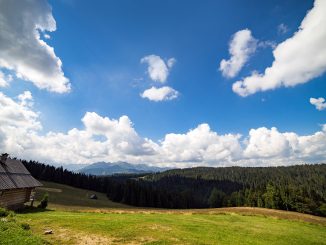Sebastian Lakner examines what the new German coalition government has in store for agricultural and rural policy – is it a coherent document, or simply all things to all people?

Now, since March 14, 2018, the facts are on the table: Angela Merkel has begun her fourth term as Chancellor of Germany. Her ruling Grand Coalition has a comfortable 44 seats majority and will continue as in the years before, where the liberal conservative Cristian Democratic Union (CDU), her Bavarian’ sister party, the Christian Social Union (CSU) and the center left Social Democrats (SPD) formed the government. A referendum within the SPD agreed to the new coalition agreement and opened the door for the new government and CDU/CSU gave their consent to the agreement as well. Julia Klöckner (CDU) has been welcomed in as Agriculture Minister and Svenja Schulze (SPD) as Minister for Environment.
What we can expect from that new government in terms of their agricultural policy and more specifically for the reform of the Common Agricultural Policy (CAP) in 2020? Emanuel Macron seems to be interested in quite ambitious CAP reform and has already suggested some ideas how to develop the European Union (EU). There is a lot of unrest within the EU, especially with regards to the refugee crisis with a pressure on Germany and France to lead. So ahead of the new CAP-reform in 2020, can we expect some new ideas and new ambition?
What are the projects in the new coalition-agreement?
The agreement reached on farming and food by the partners is a mixed bag with the stated objective of sustainable agriculture, covering everything from conventional to organic practices. Both parties state that sustainable farming and conservation are no contradiction.
“We want a multifunctional, peasant and entrepreneurial [system] as well, with focus on family farms and regionally based agriculture.”
- EU Agricultural Policy: The most disappointing and least ambitious section of the agreement concerns CAP reform with the same budget but lacking a clear statement of goals. The CAP budgets shall be directed to “animal welfare, conservation and climate” while at the same time will still “stabilize farm incomes”, which is quite ambiguous. “Less bureaucracy” and “more efficiency” may sound nice, but in sum, it is unclear where priorities are within the CAP. The only interesting remark is for more attention to less productive areas.
- Support of Rural Development: The new coalition aims to support “lively and attractive rural areas,” specifically by extending national support for Pillar II. The additional funding option should be extended for rural development and climate change, which is new. Additionally, there is a focus on digitalisation, important in a country where fast internet in rural areas lags behind other EU countries.
- Organic Farming: There is a clear statement to further support and increase organic farming: the objective is to reach 20% by 2030. This is based on a coupling of financial support in a market-oriented agricultural system, which might be tricky to accommodate. This support of organic farming includes examples of best practice and approaches like the network of Community Supported Agriculture (CSA). This is probably the first time that CSA is mentioned at such a level in Germany, which created some positive feedback within the CSA-community: This is definitely something new! The new government also seeks to support home grown protein crops.
- GMO: The new coalition plans to forbid genetically modified plants.
- Plant protection: The new government wants the implement a strategy for arable farming including a reduction of pesticides and a substantial reduction of Glyphosate in order to protect biodiversity. The agreement also calls for more research in the area. A complete ban of glyphosate (as demanded by the NGO-scene) will not take place, yet a reduction strategy might be a better science-based approach, given the fact that there exists no assessment on the potential health risk of glyphosate-replacements. A pesticide tax, as suggested by the Green Party is not in the agreement but might be interesting alternative to a complete ban.
- Conservation & Environment: Hailed as the work of the environment team within the SPD, this section includes the implementation of a biodiversity strategy which is more progressive than in the four years prior. The agreement contains surprising sentences like: “We care especially about the bees” (“Dabei liegt uns der Schutz der Bienen besonders am Herzen”, p.85), announcing an action program to protect insects (p.139). The new government also seeks a dialogue on environmental friendly farming practices to protect groundwater, though a previous proposal of a clean groundwater fund was scrapped. In general, there are a number of remarks promoting more conservation and environmental protection. Attention is now on the minister for environment to implement those points. Additionally, the new coalition wants to restrict the reduction in farmland for infrastructure projects to 30 ha/day – a quite ambitious target given the actual figure of 63 ha/day in 2014 [1]. The coalition wants to use “legal and economic instruments” – as if those instruments haven’t been there in the previous period 2013-2017.
- Animal Welfare: The government wants to implement a new animal welfare label by 2019, providing a legal definition of what such welfare standards should look like. Additionally, the agreement mentions the continued reduction of antibiotics usage, the objective to replace animal testing in medicine and the improvement of live animal transportation. A lot of that sounds quite progressive, however the agreement mentions that old animal production systems have protection, which is, again, a contradiction which inhibits some of the suggested changes.
Some critical remarks:
The agreement contains a number of quite ambitious statements, often diluted with moderating sentences. Whilst there is a link to societal demand for public goods and progressive, leftwing politics, clear priorities remain scarce and much of the agreement is contradictory.
- Organic Farming: In 2017, about 8.2% of farmland was managed organically, and 10.9% of the farms were organic [2]. There is a steadily growing market and stable organic sector, especially compared to the price drop for non-organic milk. During the last years, many federal states increased support of organic farms, which lead to quite high conversion rates in 2016 and 2017. However, a transition to 20% organic agriculture by 2030 will be a challenge, given this link between markets and politics. If we follow the trends from either 2000-2017 or 2012-2017, we might reach the 20% target in 2049 or, more pessimistically, in 2070.

In 2017, the Ministry for Food and Agriculture published its strategy for organic farming, called Organic Farming Looking Forwards (.pdf) led by Dr. Jürn Sanders from Thünen Institute. This provides a rich collection of facts and many new ideas and strategies for how to increase the share of organic farming in Germany. This could be the textbook the new government needs. According to their calculation, Germany needs 30-40 thousand farmers to reach the 20% target. This will not be a Sunday picnic. The new government promises a lot, with little indication of how to keep them.
- CAP: CAP is probably the area with largest financial and political impact and yet the coalition lacks a clear agenda and ambition. How the new government wants to accommodate animal welfare, environment and conservation objectives with a market-oriented agriculture, simplification of CAP and stable incomes, remains unclear. This is like squaring the circle.
Positive Aspects:
Some interesting points emerge such as the “biodiversity centre”, the implementation of the “biodiversity strategy” as well as an arable strategy and an improved animal welfare label (which has been on the agenda for years now). These tangible suggestions may be implemented on the national level. The reform of the national co-funding of rural development programs (Community task for Agriculture Structure Coastal Protection (GAK)) might give some new stimuli for the farming sector within Pillar II. Whilst nothing is lost in the agreement, it could be more ambitious.
Who are the relevant actors in the new Grand Coalition?
While the program allows all different kinds of agricultural policies, a lot will depend on the personnel: New Agriculture Minister, Julia Klöckner (CDU) has some links to the farming and wine sector and many years ago, she was “wine princess” in her hometown in Rhineland Palatinate. She is known to be ambitious and media savvy. For some policy experts, she is regarded as one of the potential Merkel-successors. I would expect her to be more active than her predecessor Christian Schmidt (CSU), who barely used the potential to do agricultural policy. The controversy began before she took office when she suggested the use of some selected pesticides within organic farming, to the discontent of the organic farming association. But Mrs. Klöckner is smart, so she will not rule against NGO or organic farming association, but rather seek communication. On the other hand, she will be in touch with the German Farmers Association (DBV) as well.
The Ministry of the Environment is in the hands of the SPD again. Previously, Barbara Hendricks (SPD) quite successfully brought environmental interests to the fore. New minster for environment, Svenja Schulze (SPD), is from North Rhine-Westphalia and does not have much background in environmental policy. So her role will be, to some extent, a surprise.
Overall, it is difficult to forecast the work and cooperation of new ministers in a government. I would expect Julia Klöckner to be more active, perhaps picking up some of the progressive ideas in the coalition agreement. But the main tendency with her will be business as usual, as in the years before.
[1] See German Indictors for Sustainable Development 2016, in German, p.72.
[2] See information of the German Ministry for Food and Agriculture (BMEL) and the German Association for Organic Food and Farming (BÖLW)






1 Trackback / Pingback
Comments are closed.